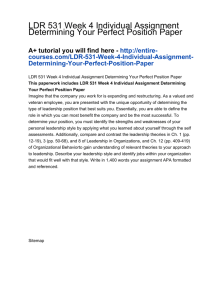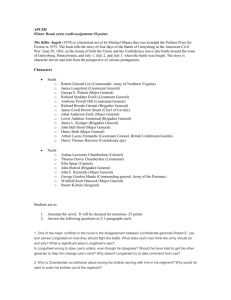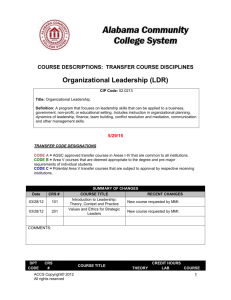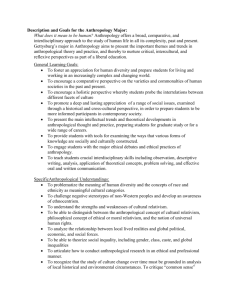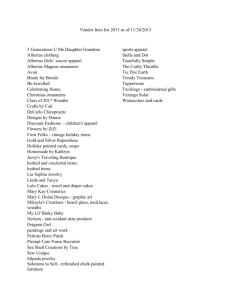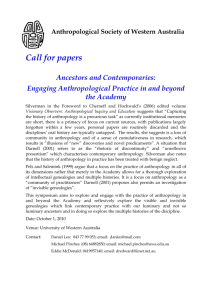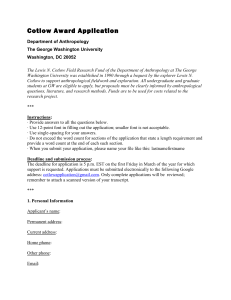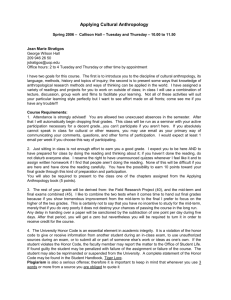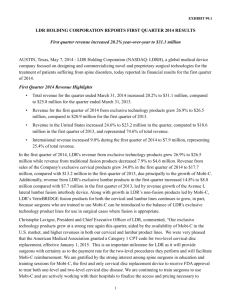LDR 504 Cultural Anthropology and Leadership
advertisement
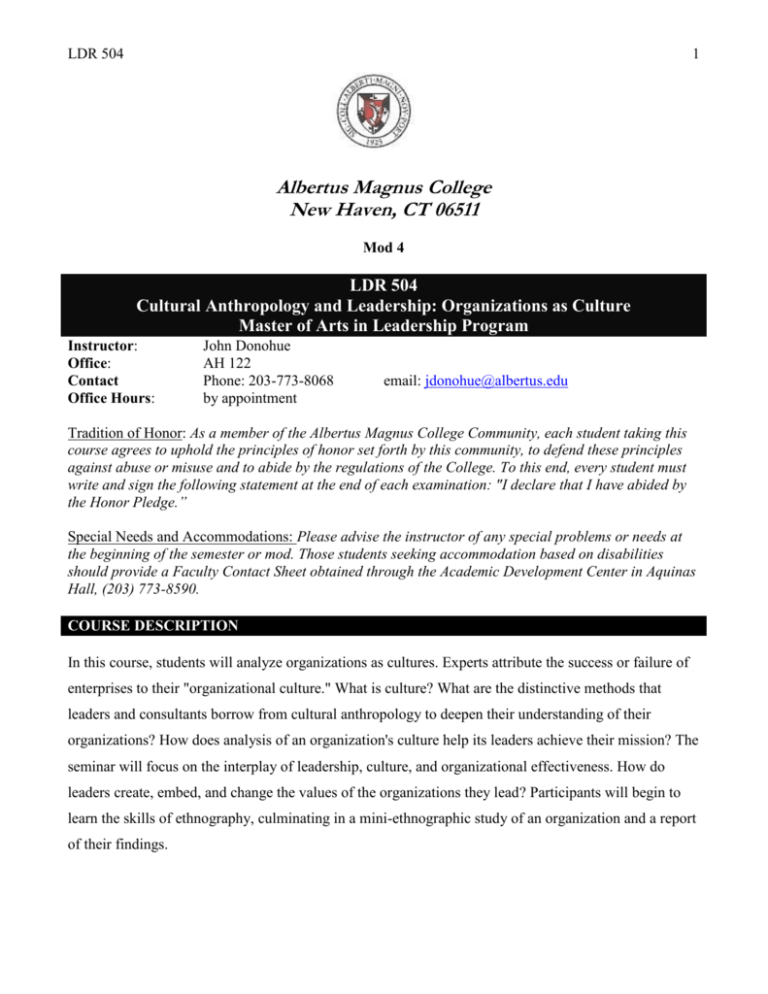
LDR 504 1 Albertus Magnus College New Haven, CT 06511 Mod 4 LDR 504 Cultural Anthropology and Leadership: Organizations as Culture Master of Arts in Leadership Program Instructor: Office: Contact Office Hours: John Donohue AH 122 Phone: 203-773-8068 by appointment email: jdonohue@albertus.edu Tradition of Honor: As a member of the Albertus Magnus College Community, each student taking this course agrees to uphold the principles of honor set forth by this community, to defend these principles against abuse or misuse and to abide by the regulations of the College. To this end, every student must write and sign the following statement at the end of each examination: "I declare that I have abided by the Honor Pledge.” Special Needs and Accommodations: Please advise the instructor of any special problems or needs at the beginning of the semester or mod. Those students seeking accommodation based on disabilities should provide a Faculty Contact Sheet obtained through the Academic Development Center in Aquinas Hall, (203) 773-8590. COURSE DESCRIPTION In this course, students will analyze organizations as cultures. Experts attribute the success or failure of enterprises to their "organizational culture." What is culture? What are the distinctive methods that leaders and consultants borrow from cultural anthropology to deepen their understanding of their organizations? How does analysis of an organization's culture help its leaders achieve their mission? The seminar will focus on the interplay of leadership, culture, and organizational effectiveness. How do leaders create, embed, and change the values of the organizations they lead? Participants will begin to learn the skills of ethnography, culminating in a mini-ethnographic study of an organization and a report of their findings. LDR 504 2 COURSE OBJECTIVES 1. The student will be able to demonstrate an understanding of the characteristics of culture. 2. The student will explain how the tools of cultural anthropology are applied to studies of organizations. 3. The student will explain the relationship between organizational structure and effective leadership. 4. The student will demonstrate the ability to integrate anthropological knowledge and techniques through the production of a written mini-ethnographic study of an organization. GRADING POLICY AND METHOD OF EVALUATION Grades will be earned through the completion of seven written assignments: 1 2 3 4 5 6 7 TOPIC In a 2-3pp paper, research a specific leader and explains how she or he supports or challenges different theories of leadership In a 2-3 page paper, outline the life of Robert E. Lee. Was he a born leader or did he develop this ability? Use at least 3 print or online sources in addition to Shaara. In a 2-3 page paper describe how varying cultures or social types can shape the qualities needed to be a leader. In a 2-3 page paper compare and contrast the leadership styles of Lee and Chamberlain, relating them to their individual backgrounds and the “culture” of the armies they served in. In a 2-3 page paper, explain the characteristics of culture and how the dynamics of culture can be both overt and covert, using the example of the Hawthorne study. In a 2-3 pp. paper, outline a proposal for the ethnographic study of an organization In a paper of at least 10 pp., present the result of your research, detailing its insights, limitations, and suggesting avenues of further research All assignments must be typed and properly formatted (12 pt, double-spaced) and utilize the APA citation format. All papers must be submitted electronically in Word format no later than10:00 pm on the date due. Submissions are sent to jdonohue@cc.albertus.edu. The instructor is available for questions, discussion, etc. either by phone (203-773-8068) or electronically at jdonohue@albertus.edu. Points 10 10 10 10 10 10 40 LDR 504 3 CLASS SCHEDULE WEEK IN CLASS ON LINE 1 3/24 3/29 2 3/31 4/5 3 4/7 4/12 4 4/14 4/19 5 4/21 4/26 6 4/28 5/3 7 5/5 5/10 8 5/12 5/14 TEXTBOOK(S) and/or SUPPLEMENTARY READINGS Required Texts: Jordan, Ann T. 2003. Business Anthropology. Long Grove, Ill: Waveland Press ISBN-10: 157766213X ISBN-13: 978-1577662136 Schwartzman, Helen B. 1993. Ethnography in Organizations Newbury Park, CA: Sage Publications ISBN-10: 0803943792 ISBN-13: 978-0803943797 Shaara, Michael 2004. The Killer Angels. Modern Library ISBN-10: 0679643249 ISBN-13: 978-0679643241 Supplementary Readings As provided in Shared Files LIBRARY COMPONENTS As needed LDR 504 4 TOPICS and ASSIGNMENTS WK TOPIC CLASS BL Reading 1 Leadership: Overview Traits, Process Are leaders born or made Class Notes Begin Killer Angels 2 Culture Definition, Characteristics, Human Plasticity R.E. Lee: leader as archetype* Class Notes Finish Killer Angels 3 Social Organization Structure Function Levels of Complexity How do culture and society shape leaders? Chamberlain Malinoswki Radcliffe-Brown 4 Complex Organizations Mission Hierarchy Process 5 Organizational Anthropology 6 Research 7 8 Discussion Compare and Contrast: Lee and Chamberlain* Murphy Weber Cultural Dynamics: Overt and Implicit the Hawthorne Effect Jordan Schwartzman Designing a Study Study Proposal** FIELD Prepare 10 minute presentation Class Presentations Paper*** Assignment In a 2-3pp paper, research a specific leader and explains how she or he supports or challenges different theories of leadership In a 2-3 page paper, outline the life of Robert E. Lee. Was he a born leader or did he develop this ability? Use at least 3 print or online sources in addition to Shaara. In a 2-3 page paper describe how varying cultures or social types can shape the qualities needed to be a leader. In a 2-3 page paper compare and contrast the leadership styles of Lee and Chamberlain, relating them to their individual backgrounds and the “culture” of the armies they served in. In a 2-3 page paper, explain the characteristics of culture and how the dynamics of culture can be both overt and covert, using the example of the Hawthorne study. In a 2-3 pp. paper, outline a proposal for the ethnographic study of an organization Conduct study In a paper of at least 10 pp., present the result of your research, detailing its insights, limitations, and suggesting avenues of further research LDR 504 5 Paper Topics * For the short papers on leadership style, base your discussion on at least three cited sources, including Shaara’s book, as well as our discussions. ** Basing your plan on the discussions in Jordan and Schwartzman, outline a proposal for a miniethnographic study of an organization in a 5pp. paper. Indicate what secondary resources exist relating to the organization in question, describe your access to the members of the organization, and indicate the scope of the ethnographic description and the methods you will utilize to research organizational culture, structure, and leadership styles. Note: Liberal Studies students may substitute a case study of leadership or a leader in literature or history, being careful to utilize an anthropological perspective. *** In a 15-20 pp. report, detail the activities completed and the information collected. Utilizing the anthropological perspective, what insights did you come to regarding culture, organization, and leadership? Did your conclusions fit your expectations? Why or why not? How useful was anthropological analysis in understanding the organization? Include a list of sources. LDR 504 http://americancivilwar.com/south/lee.html http://www.nps.gov/archive/gett/getttour/sidebar/chambln.htm http://community.curtislibrary.com/pejepscot/joshbiog.htm http://www. 6
